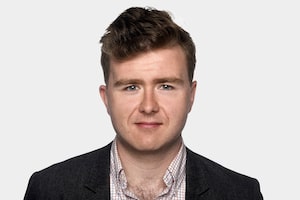Drake cares a lot about image control.
The Toronto-raised hip-hop artist projects a carefully sculpted duality: He transmits emotional sensitivity while rhyming about grandeur and recklessness. When he's not writing songs about drunk-dialing exes, he's proclaiming his motto (literally, as rapped in his song The Motto) that You Only Live Once.
The acronym YOLO has become a modern-day Carpe diem for millions of Drake's fans. On Monday, Drake found out someone else was profiting from his image – and he wasn't happy about it. He posted an Instagram photo of YOLO-emblazened hats at a Walgreen's store, writing, "You gotta either chill or cut the cheque." The musician followed that up with a photo of a shirt at Macy's bearing Peanuts characters Charlie Brown and Snoopy and the phrase "YOLO is my motto."
What isn't clear, though, is if Drake – originally named Aubrey Graham – has a case for holding the intellectual property rights behind YOLO.
Among the rights enshrined in law for songwriters is the right to reproduce lyrics, which can only legally be done with a licence from the song's publisher. But while lyrics are automatically protected by this right, YOLO is really just an acronym for a four-word phrase.
This becomes murky territory in court, said David Basskin, president of the Canadian Musical Reproduction Rights Agency and an intellectual-property lawyer. "It's easy to say 'Cut the cheque,'" Basskin said, "but whether or not this is subject to copyright really depends on the facts of the case."
Drake's Toronto-based lawyer Chris Taylor did not immediately respond to an interview request to clarify the musician's copyright aims. And because these kinds of cases are rare in Canadian copyright law, it's hard to predict what kind of case Drake would have, Basskin said; these kinds of cases can take years to resolve, and often settle out of court, leaving little public record behind.
Drake certainly isn't the first person in pop culture to proclaim the notion that you only live once. Fritz Lang directed a 1937 film of the same name starring Henry Fonda; and Ian Fleming riffed off the phrase with his James Bond book and film You Only Live Twice. The Strokes released a song in 2006 actually named You Only Live Once.
The hip-hop artist would have a stronger argument in court if he filed to have YOLO trademarked. But he wouldn't be first in line. A British Columbia wine company had #YOLO given trademark approval notice earlier this month, and a Toronto travel agency has applied to trademark YOLO this year as well. In the United States, dozens of applications have been made to trademark YOLO since Drake's single was released a year ago as a bonus track to his 2011 album Take Care.
If he were to file a trademark application in Canada, Drake would have to establish his intent to use the phrase on products or he'd have to prove that it's distinctive to him in a specific context (in other words, that people think of him or his song or his musical performances when they hear the phrase), which could be a challenge when the phrase predates the Canadian artist.
"At some point, you have to use the mark before you can register it," said Sheldon Burshtein, an intellectual lawyer and partner with Blake, Cassels and Graydon LLP.
But that doesn't mean Drake wouldn't have a case: When it comes to trademarking aspects of pop culture, Burshtein says things can get complicated. "When you look up the definition of 'trademark' … it's a mark that distinguishes the goods or services of one person from those of all others," said Burshtein. "That's why these things are tricky, because, colloquially and in pop culture, people tend to get associated with a term and it becomes sort of an informal trademark – part of the brand, if you will – but it may or may not be [grounds for] a legal trademark."
Drake wouldn't be the first celebrity to try to trademark a catchphrase. Paris Hilton managed to trademark "That's hot" and fashion designer/reality-TV persona Rachel Zoe has successfully registered "I die," one of her common sayings. NFL star Tim Tebow was successful at getting the ownership of "Tebowing," while NBA player Anthony Davis Jr. has put in a claim to trademark "Fear the brow" in order to control the merchandising based on his famous unibrow.
with files from Madeleine White
 Josh O’Kane
Josh O’Kane